#JOBSSAVELIVES
Tables laid bare around South Africa as industry fights back
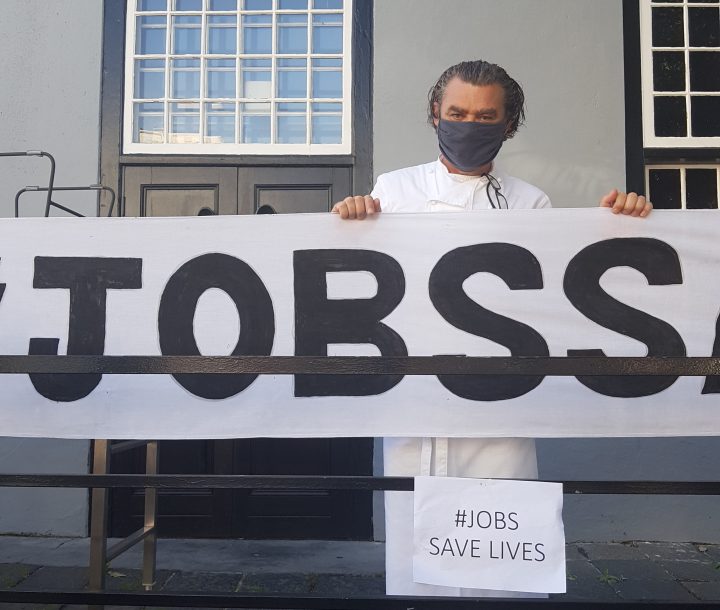
It’s been an emotive, challenging week for anybody involved in the hospitality and related industries. But you were heard, and there was solidarity in an increasingly desperate cause.
In Cape Town, KIM MAXWELL writes:
1 million seats on the street. You’ve watched or read a lot about it this week. A collaborative campaign by restaurants around South Africa, where President Cyril Ramaphosa was asked to “take up a seat at any of our empty tables to talk to us about the hardships we’re facing” on Wednesday 22 July, using the #jobssavelives hashtag.
“Wendy Alberts and the Restaurant Association of South Africa (RASA) put the million seats concept together. The goal of the peaceful protest is to allow alcohol sales and to lift the 9pm curfew,” explained Liam Tomlin, the Cape Town and Winelands chef and restaurateur behind three Chefs Warehouse restaurants, Thali and Jewell’s. Out of season, those five restaurants provide 230 jobs.
“#Jobssavelives was something I started straight after the President’s speech about banning alcohol sales. I said to all my chefs that I wanted them to stand outside their restaurant and to write down how many each restaurant employs. Then share it on Facebook and Instagram,” said Tomlin. Frustrated and fed up, South Africa’s hospitality industry quickly followed suit.
On Wednesday, the peaceful restaurant protests came too. On a massive national scale, dining tables and placards were moved outdoors, chefs chanted slogans and wore whites – in Franschhoek, some laid them out symbolically below a #JobsSaveLives banner, to crowd applause. Owners, waiting staff, musicians and customers spilled onto roads in Hout Bay to Hermanus, Caledon to Hartenbos, Kalk Bay to Paarl, Port Alfred to Umhlanga, Howick to Clarens, Fourways to Boksburg.
The hospitality industry is both family-owned eateries and high-end dining, urban franchises and small country venues, guesthouses and cafes to artisanal butchers, food, coffee and beverage suppliers. Here are some of their stories:
Robertson: Social distancing in solidarity
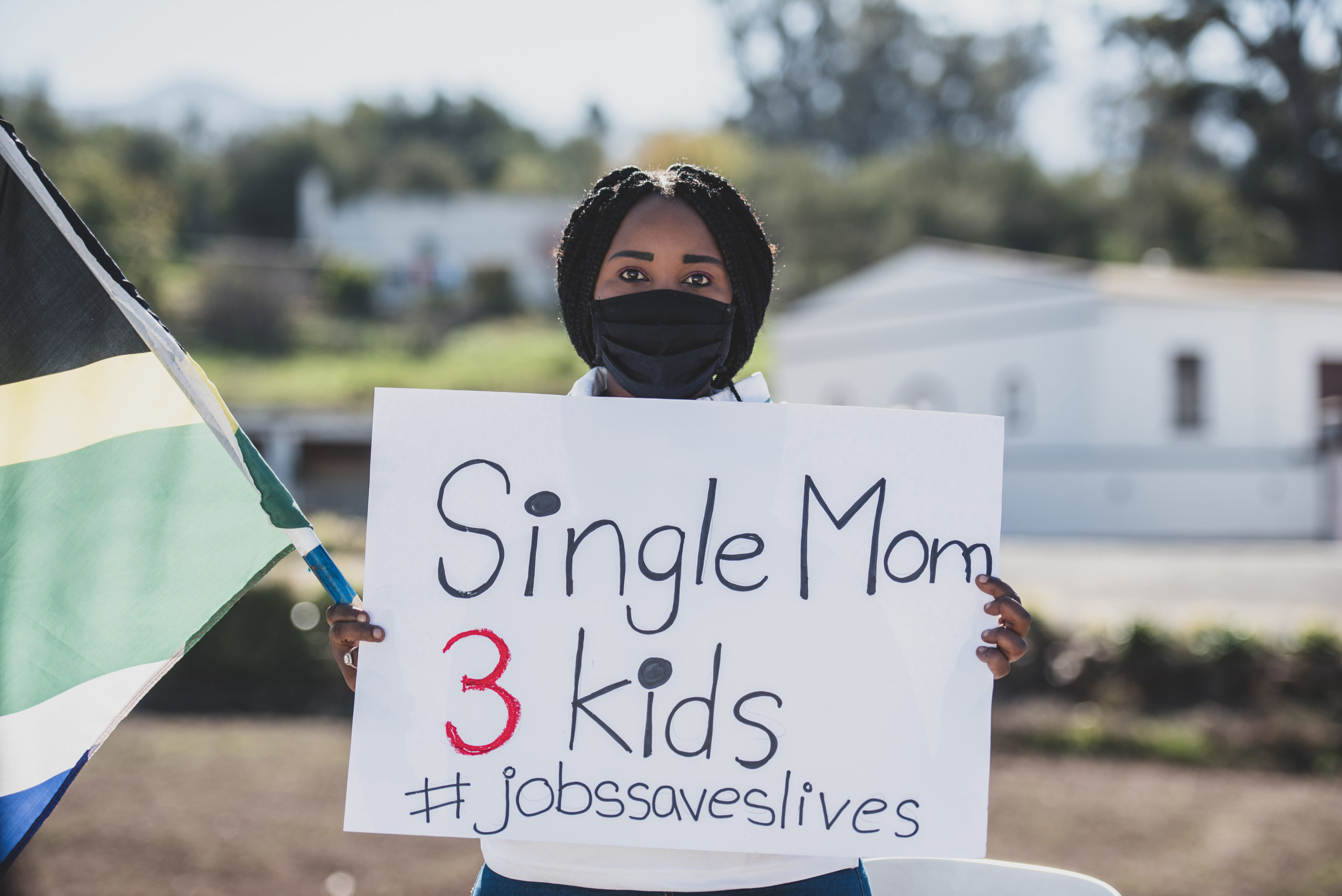
Single mother Mignon Maile, manager of @Four Cousins restaurant in Robertson. (Breede Photography)
The staff of popular @ Four Cousins restaurant wanted to peacefully protest in Robertson, but were stumped when the local police station denied their request because they deemed it a social gathering.
Restaurant manager Mignon Maile had a creative solution, measuring out 10 metres between every staff member seated on a restaurant chair, so they would be “properly socially distanced”. In view of the restaurant, chairs were spread on the road from Robertson town in the direction of Worcester.
“Amongst ourselves, we decided we couldn’t do a protest because they said we’re having a social gathering and we’re not. So each one of us would be there individually,” said Maile. “We were there to voice our opinion about places closing down and people losing their jobs. Each of us had a mask. We weren’t causing trouble or burning tires, we just wanted to silently sit there with our signs.”
The restaurant employs 55 people, all permanent workers. “We haven’t retrenched anyone, but we’re not even at half capacity staff. We’re only working with a certain number of people, so we have a group A and group B, and alternate week to week.”
“Our bosses have loaned extra money from the bank – we are living off R750 a week. At soon as everything is back up and running, we’ll be paying back the interest-free loan. There was UIF in July, but you wait so long for it. If it wasn’t for that R750, I don’t know how I’d survive.”
Maile is a single mother of three children who need funding for school fees. “Me personally, I feed six people, including my parents. Others here at the restaurant are feeding 10 people. Waiter Albert Taruwinga, is supporting four families, here and in Zimbabwe.”
Four Cousins has been trading for two months. “If we can at least sell two bottles of wine per customer, it will be much better,” Maile suggested. “They don’t want to sit in a restaurant in a wine area if they can’t enjoy a bottle of wine.”
Salt River: Interactive empathy
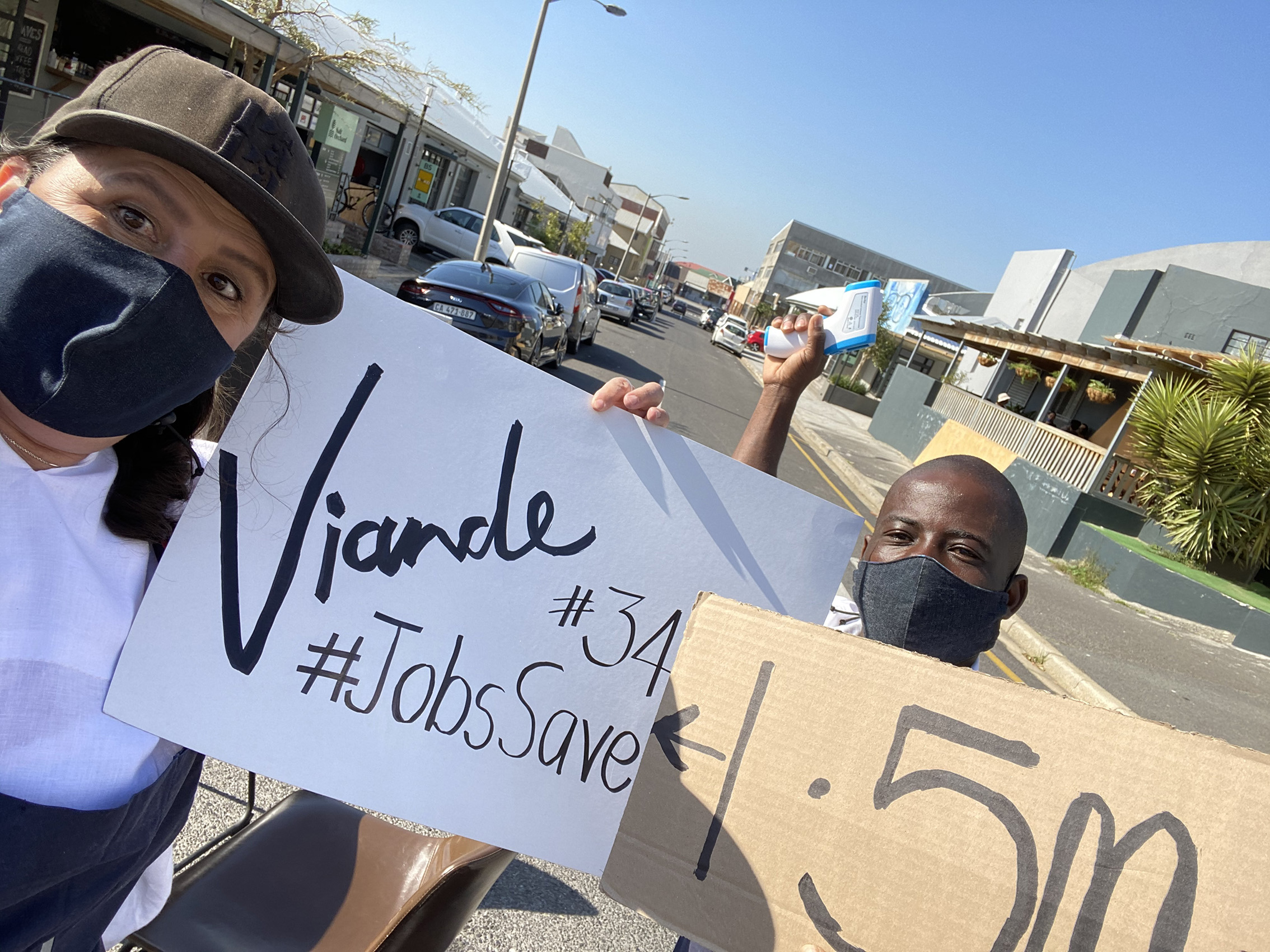
Staff of Viande in Salt River stand heir ground. (Photo: Elize Goffe-Wood)
Jade de Waal converted her Salt River, Cape Town, Food Jams business into a community kitchen initiative during lockdown. She reopened her Food Jams business in July, the plan being to host socially distanced cooking sessions for the public again. On Wednesday, the Food Jam team joined a small protesting Salt River group that included Viande and Table Seven restaurants, plus Sepial’s Kitchen, the Fire and Smoke food truck, and artisanal baker Loaves by Madame Baker.
“The past few days have been tough. It felt like staring into a dark hole and I felt defeated,” said De Waal. “We are in the business of jolliness and human connection through food. Kitchens and restaurants are my safe space. Before Covid-19, guests often walked into our sessions with their spirits low, only to walk out after four hours glowing, laughing, singing and hugging our team.
“Missing the physical frequency of guests, we were so happy to tune into the peaceful restaurant protest this week, with alma maters across the country.”
Hermanus: Charged for a worthy cause
Rudolf van der Berg owns Burgundy Restaurant overlooking the old harbour, on Marine Drive in coastal Hermanus. The restaurant reopens for trading this weekend, for the first time since March.
“We [Hermanus restaurateurs] applied for permission to protest. We heard one person in the municipality didn’t approve it, so the police were asked to stop us,” he said. The group decided to go ahead anyway, filling the road with restaurant tables.
Overberg Deputy Mayor Elnora Gillion stepped in to intervene, showing her support with a compromise. “Elnora really supports our cause. She arrived and told the police she feels strongly about this,” says Van der Berg. Gillion told the crowd the protest was necessary to support the economy of the town, lives and jobs.
“She asked restaurateurs to move to the pavement,” said Van der Berg. “We didn’t, but continued to keep the tables in the road. The police eventually opened a docket against me and one other restaurateur for not clearing the road.”
Van der Berg says his method of protest was a peacefully defiant act of support. “We stayed right there. What I did is completely out of character; I don’t do this kind of thing normally. But I felt I had to take a stand for my 63 staff. I’ve already had to retrench 14, and end the contracts of four staff.
“During the past few months, we couldn’t afford to pay extra salaries and our staff depended heavily on TERS. We had to borrow money and were still responsible for 50% of our rent,” he said.
“Yesterday was incredible: until late last night, people were phoning and sending messages from around South Africa. Will it make a difference, I don’t know? About 80% of my staff live in Zwelihle township; my unemployed staff will suffer the most. The reality is that people are fed up.”
Franschhoek: A veteran gets real
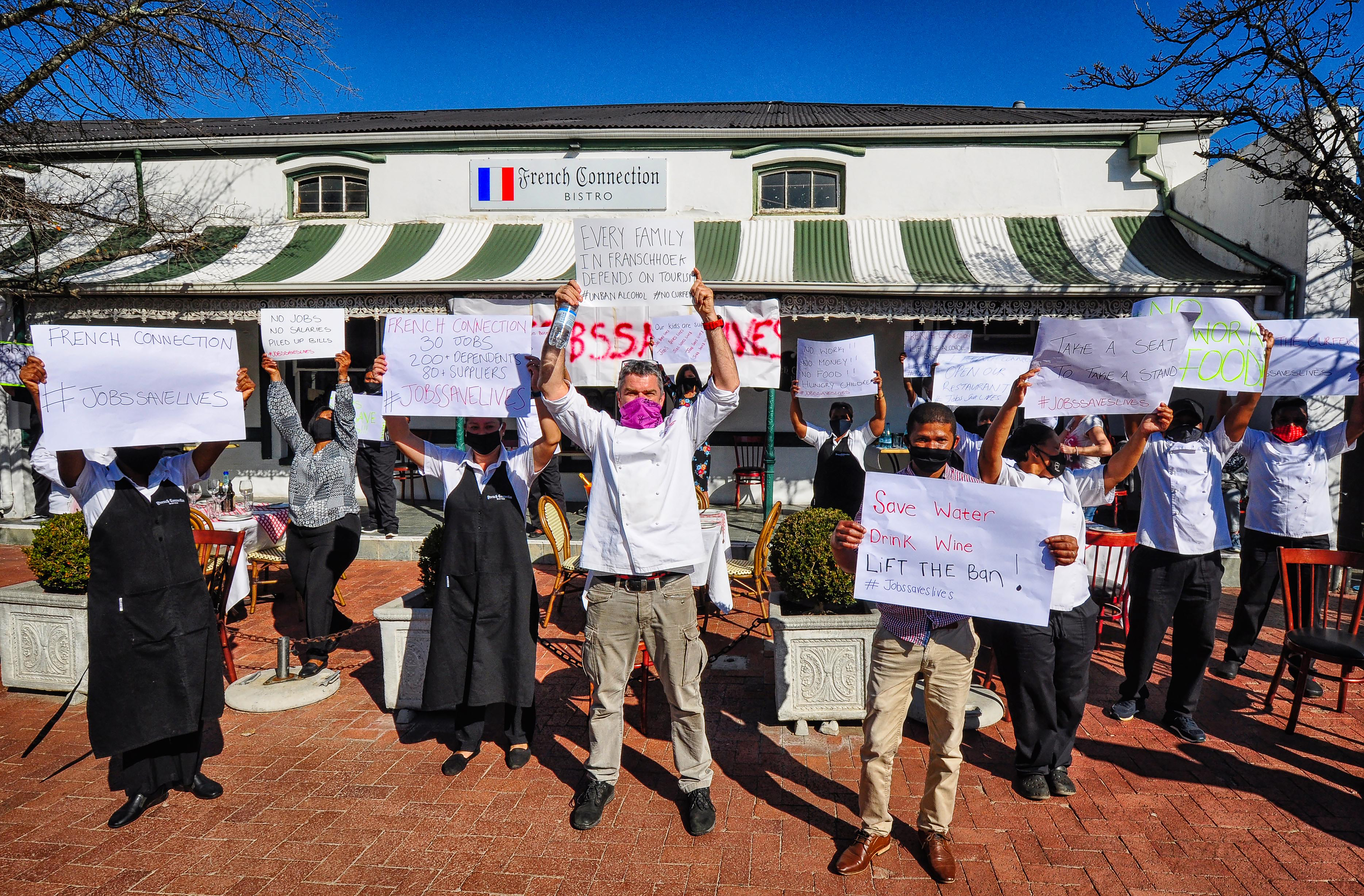
Veteran restaurateur Matthew Gordon and his French Connection staff. (Photo:
Restaurant owner and chef Matthew Gordon stood alongside 30 full-time staff outside The French Connection Bistro in Franschhoek’s main road this week, quietly protesting. Its doors have stayed closed for four months. Gordon said it was useful for a show of support, but he isn’t confident things will improve. “The alcohol and curfew is a really tough game. Even trading with the social distancing is going to be a struggle. Because you’re doing half your customers and also trying to gauge customers’ appetites to eat out, especially in a small town like Franschhoek, so reliant on tourists.
“Even if we’re up and running properly in October or whenever, the foreign tourists aren’t going to be here. There is no cushion: the 2020/2021 season as we know it is gone. So it’s a very, very grim situation,” he said. “My business has been going for 18 years and was in a relatively strong position to start with. But it’s survival mode now, that’s for sure.
“As an owner, the business is taking huge strain. I borrowed R350,000 to pay my guys half salaries, via a loan from the Oppenheimer trust. It went straight to my staff, plus the TERS/UIF for those staff who qualified. But that loan is now coming to an end, after three months. My senior staff are not seeing the kind of money they’re used to; they’re taking some pain. The junior staff are in slightly better shape financially,” he said.
“We haven’t even talked about the knock-on effect on the smaller guys. The artisanal charcuterie and cheese suppliers, bakers and butchers. Sue Baker in Stellenbosch had a massive gourmet food business supplying just about every chef I know. Now it’s trading, but on life support. The recovery, when it does come, is going to be slow. Not everybody is going to make it.”
Everywhere else
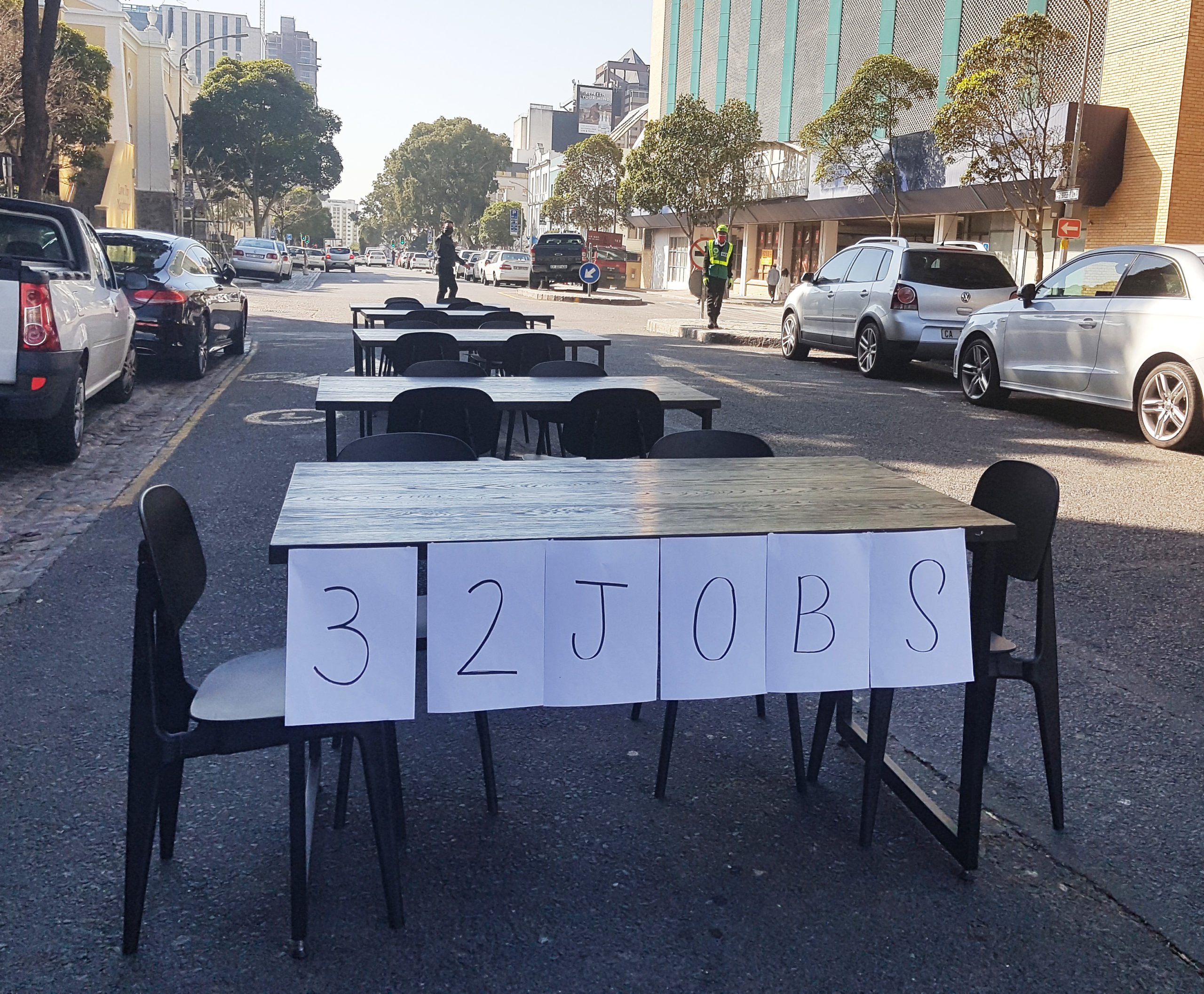
Empty tables taking over Bree Street. (Photo: Kim Maxwell)
In Cape Town’s Bree Street, commonly known as the CBD’s food street, Sommeliers Academy principal Jean Vincent Ridon marched alongside chef Tomlin and other restaurateurs. “I have no sommelier students at the moment, and we can’t sell wine to restaurants either,” said Ridon. “Some of my students are marching in Joburg and Durban today to show support.” The spirited peaceful marching protest of 50 or 60 chefs, restaurateurs, suppliers and dining customers snaked up Bree and Kloof streets.
Chairman of Stellenbosch Tourism Mike Ratcliffe reported a turnout of about 1,000 people on Plein Street, in front of the Stellenbosch town hall. “There was lots of cheering from restaurants, wineries and suppliers. Is there anybody who is more affected than others, I’m not sure? The thing with Covid-19, it’s exposed any pre-existing cracks in so many businesses.”
But was the peaceful protest helpful in changing policy and encouraging responsible alcohol consumption? “There are a lot of people who want to return to dine in restaurants, but they want the full experience,” said Tomlin. “And that’s with alcohol, and being able to eat after 9pm. The industry support has been incredible, but it’s also been an eye-opener about how many jobs have been lost so far and how many are at risk. There is no restaurant that can sustain this for another month. Day by day, there are restaurants closing down. If the government doesn’t address it, you’re just going to see more and more businesses going against the wall.”
False hope?
Meanwhile, the negotiating continues. Ashton Naidoo, partner at Mooney Ford Attorneys, represents RASA. The industry organisation addressed a letter to the Presidency this week about the suspension of the sale and distribution of alcohol. “We’ve received a response from the State Attorney, representing the President. It says they understand the urgency and will consult with their client and get back to us,” he said.
“We were not very happy with that response. So we sent another letter on July 23, calling for a meeting with the President to discuss how we can avoid a further massacre of the economic viability of the hospitality industry. We want some sort of cooperative engagement with the Presidency and Government about its disaster management plans, to deal with the lifting of the suspension of the sale and distribution of alcohol.”
Late on Thursday, RASA was asked for a written proposal by the Minister of Tourism, Nkhensani Kubayi-Ngubane.
“We’ve got a few creative ideas around that we want to put forward via an informal meeting,” says Naidoo. One suggestion came about through RASA partnering with a UK group. RASA wants to introduce an “alcohol passport”, where a consumer will be issued with a location-specific “passport: to purchase alcohol. “It will be app based, and if your area is locked down, you won’t be able to purchase alcohol elsewhere. It’s a form of community policing,” says Naidoo.
“We’re just trying to find creative solutions so we can save the industry, while still being responsible in dealing with the coronavirus pandemic.” It’s surely worth a meeting, Mr President.
Meanwhile in Durban and elsewhere in KZN, WANDA HENNIG writes:
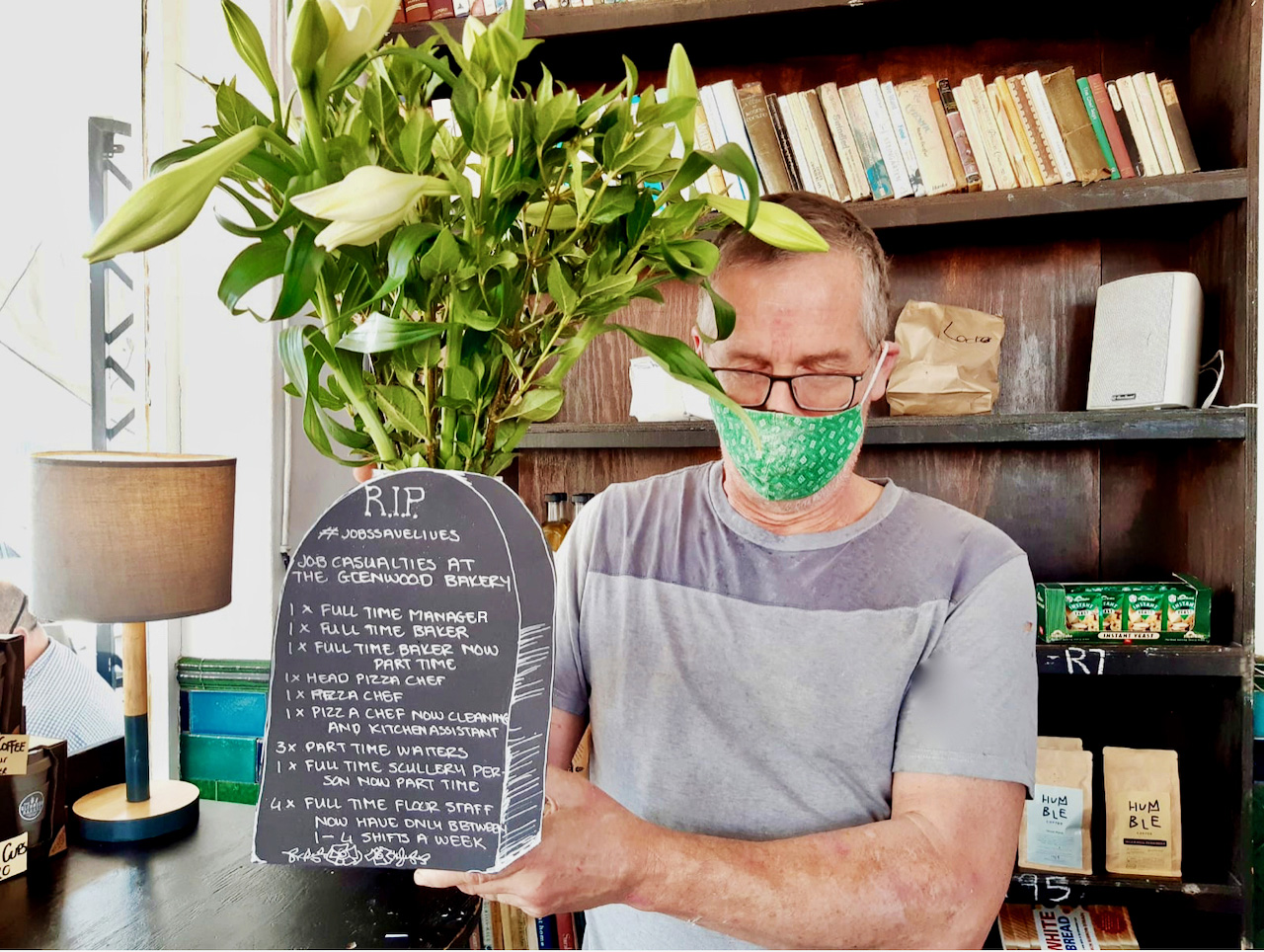
Glenwood Bakery’s Adam Robinson stands in solidarity with staff who have lost their jobs. (Photo: Carin Robinson)
It was a united plea to the government for survival when restaurants in Durban and around KwaZulu-Natal turned out to campaign for livelihoods, jobs, lives and each other on Wednesday. Not many literally pulled seats onto streets, as proposed by the Restaurant Association of South Africa. Some of the protests were noisy. At Granada Square, uMhlanga, for example, several dozen restaurant workers sang a rousing version of Nkosi Sikelel’ iAfrika. Others were more symbolic.
And a second protest – a cavalcade of more than 60 vehicles representing the tourism industry – dovetailed their lobby for the reopening of tourism in KZN with the #JobsSaveLives restaurant action. The convoy, including buses, minibuses and cars, mostly empty bar the drivers, made its way from Westville to Durban and noisily honked its way past the empty hotels along the city’s Golden Mile.
At Glenwood Bakery, chef-baker Adam Robinson, who has worked throughout the various levels of lockdown to adapt, creatively save jobs and stay in business, stood in solidarity with staff members the bakery was forced to lay off or downsize. An “In Memoriam” message listed job casualties, including a full-time baker, a full-time manager, a head pizza chef and more. The message, he said, extended to others around the country similarly impacted.
At the harbour, 9th Avenue Waterside also took a symbolic stance, posting a photo of an empty table with two chairs on social media and a message reading: “Today we stand with our fellow restaurateurs, farmers, winemakers and hoteliers. We have been battered and bruised by the restrictions placed on the industry. As the hospitality sector we cannot hold on for much longer and will face losing all we’ve fought so hard to achieve.”
“We stand in solidarity with the restaurant industry,” said Waterside’s Gina Nielson.
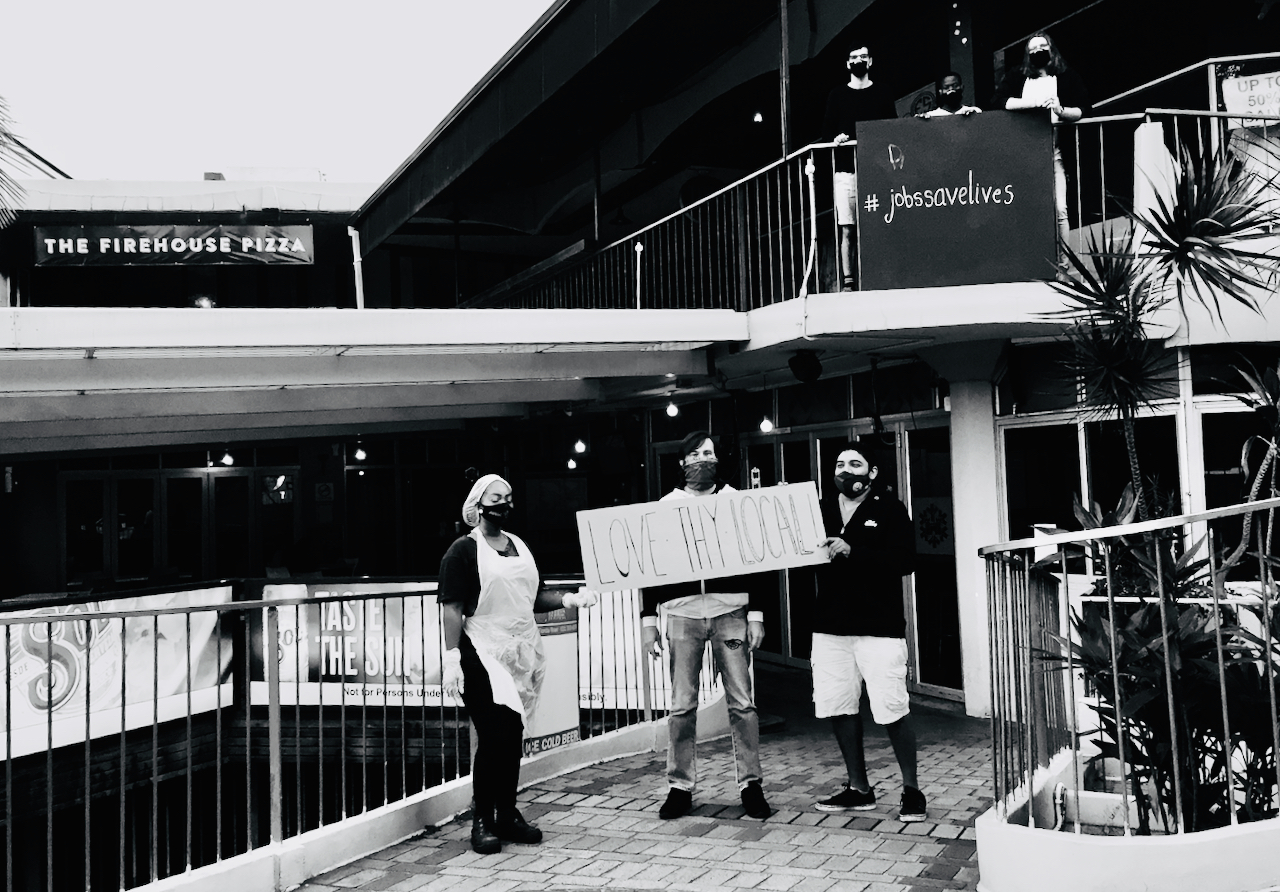
Graham Bennett, upstairs with his Firehouse team, rallies for Florida Road with the House of Curries team, below. (Photo: Supplied)
Across the city at restaurant hub Florida Road, while plans were made to take tables to the streets, the protest fizzled in the face of a strong police presence. “We have a street WhatsApp group. There was enthusiasm for unity and the protest in the group chat. But from about 11:30am, police occupied the road,” said Graham Bennett, whose The Firehouse pizzeria has taken a heavy knock through lockdown.
Several large establishments in Florida that rely on alcohol sales remain closed. Bennett doesn’t sell alcohol and his focus is takeaway and deliveries. But still, he has been hard hit by the curfew and Florida Road having become something of a dead zone.
“Today marks the third day in the history of The Firehouse where we sold zero pizzas. It isn’t easy for us to share but we know we’re not alone in this. This is why we need to come together as an industry,” he posted on Facebook early this week.
While noisy pockets of protest took place outside eateries in nearby neighbourhoods, the Wednesday Florida Road experience was “very dismal” for Bennett. “Everybody is taking a hit. It’s a domino effect. We saw the rest of the country doing what we needed to do. But, here on Florida, the franchises outnumber the independents and it would seem they didn’t feel a need.”
Bennett says he would like to see landlords receive a subsidy from the government. “We paid full rent through lockdown. There needs to be more collaboration between tenants, landlords and the government. It’s not working for tenants but it shouldn’t be the landlord who loses.”
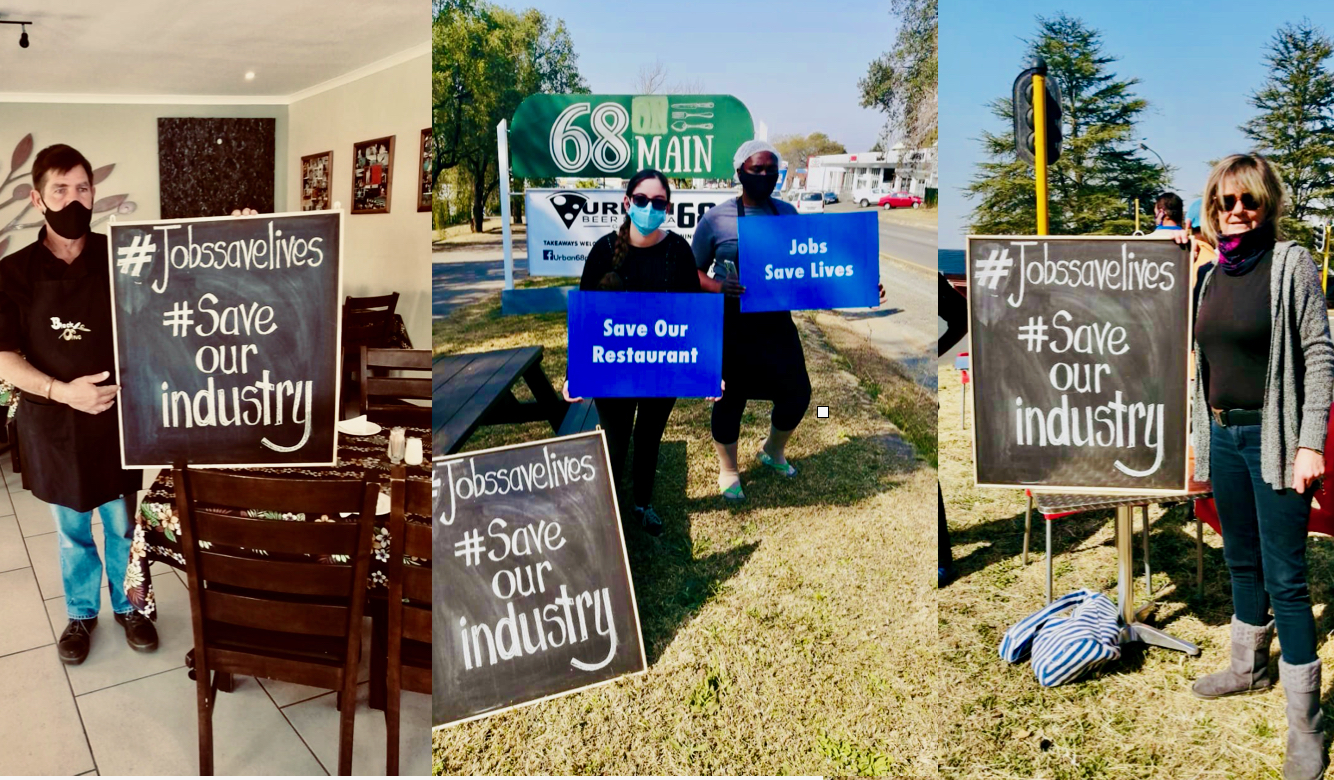
‘Drive-in’ chef Lance Mostert, left, and Ciara Cassidy, right, with others making a stand for Howick. (Photo: Ciara Cassidy)
“We had a great turnout – 10 restaurants from along the main street. I am terribly proud of this little town,” Ciara Cassidy, who pre-Covid-19 did customer experience training in Howick, said late on Wednesday.
“The devastation for this town has been heartbreaking. The restaurant closures, the job losses. We’re at the start of the Midlands Meander, which previously buzzed with life and tourism. The wedding venues, the conference centres, the BnBs, the roaring fire and farmers stopping in for beer at the Notties Hotel…”
Now, she says, it is business rescue for some, desolation for others, while a few businesses limp along. Then there are the many small farmers and suppliers in the area – milk, eggs, fresh produce – without anyone to supply.
The 9pm curfew along with the renewed alcohol ban have added big-time to the woes. “The restaurants that have kept going are following all the protocols and people are doing the best to be creative.”
For instance, at Howick’s Black Olive, owner-chef Lance Mostert has built a drive-in screen. “The waitress will serve you in your car. You eat your burger or whatever and watch a movie.” Using bluetooth, car radio or your phone, if you’re wondering, as I was. “His plan was a double feature on Friday and Saturday nights.”
The curfew has put paid to that.
“The surviving restaurants have put in all the protocols. They are set up for social distancing and safety. But we need to be permitted to function as an industry.”
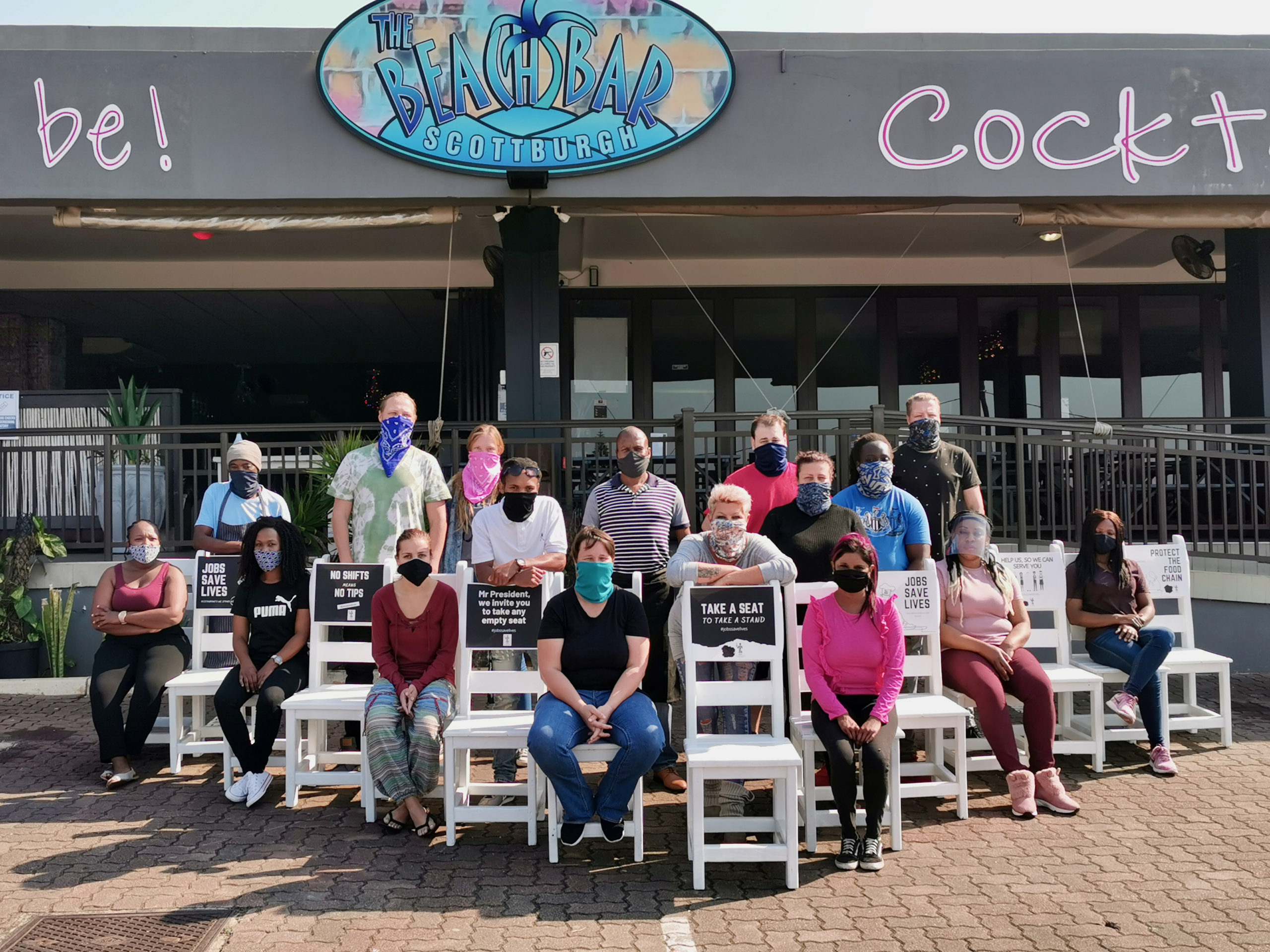
Dalene Joubert (arms folded, centre) rallies for the survival of Scottburgh. (Photo: Angelo Bender)
Restaurateur Dalene Joubert believes the survival of Scottburgh and much of the South Coast is at stake with the current restrictions. “I was covered (insurance) for R18,5-million for business interruption. The policy wording: they found a gap. They said to us, you’re not covered for a virus.”
Her argument is, “I am closed down by the government, not by the virus. If restaurants and everyone could get their insurance, we would be able to survive and be in a more powerful position to reopen.”
Joubert joined the national protest by way of chairs in the parking lot in front of her Beach Bar Bell and Anchor pub and grill on Wednesday. “The police intimidation was so high… It’s a huge parking lot, we were peaceful and we weren’t closing any street but cops came past 16 times in two hours.”
Joubert, enthusiastic, thoughtful, committed to the South Coast, is watching the devastation unfold.
“We’re a holiday town. Lots of hotels, restaurants, BnBs, diving, etc. We’re not only fighting for ourselves, our staff and our businesses. This is a total meltdown of the hospitality industry. All suppliers, big and small, are affected. The musos, the DJs, the avo guy, the ice guy, the lemon guy, the old guy I get my cleaning products from, the person doing our laundry, the bouncers, the water guy, the local grocer, the car guards. The list is endless. Twenty-eight diving charters in the area. Hotels, pubs, waterslides.
“A small town like Scottburgh relies on holidaymakers. No entertainment. No holidaymakers. Empty shops. Empty town. House values drop. No estate agents. No jobs. And I can go on and on…”
The spectre she sees looming is of Scottburgh as a ghost town.
Restaurateurs have complied with all the measures and protocols, she says. Extra cleaning, gloves, masks, takeaway boxes, sterilisers, sanitisers, signs, plastic for tables.
Her call is for an extension of the curfew to 10pm and limited alcohol sales.
“You go to a restaurant for the experience, not just because you’re hungry. You’re selling memories.” A bottle of wine for two people or a two-drink limit would do it. Get people who like to eat out coming back. Save the remaining restaurants in Scottburgh.
And an extension on the curfew to 10pm. “The kitchen has to be cleaned top to bottom. Anything hot cooled and put away. Prep for the next day. We have to close at 7pm to do this and for the staff to be home by 9pm.”
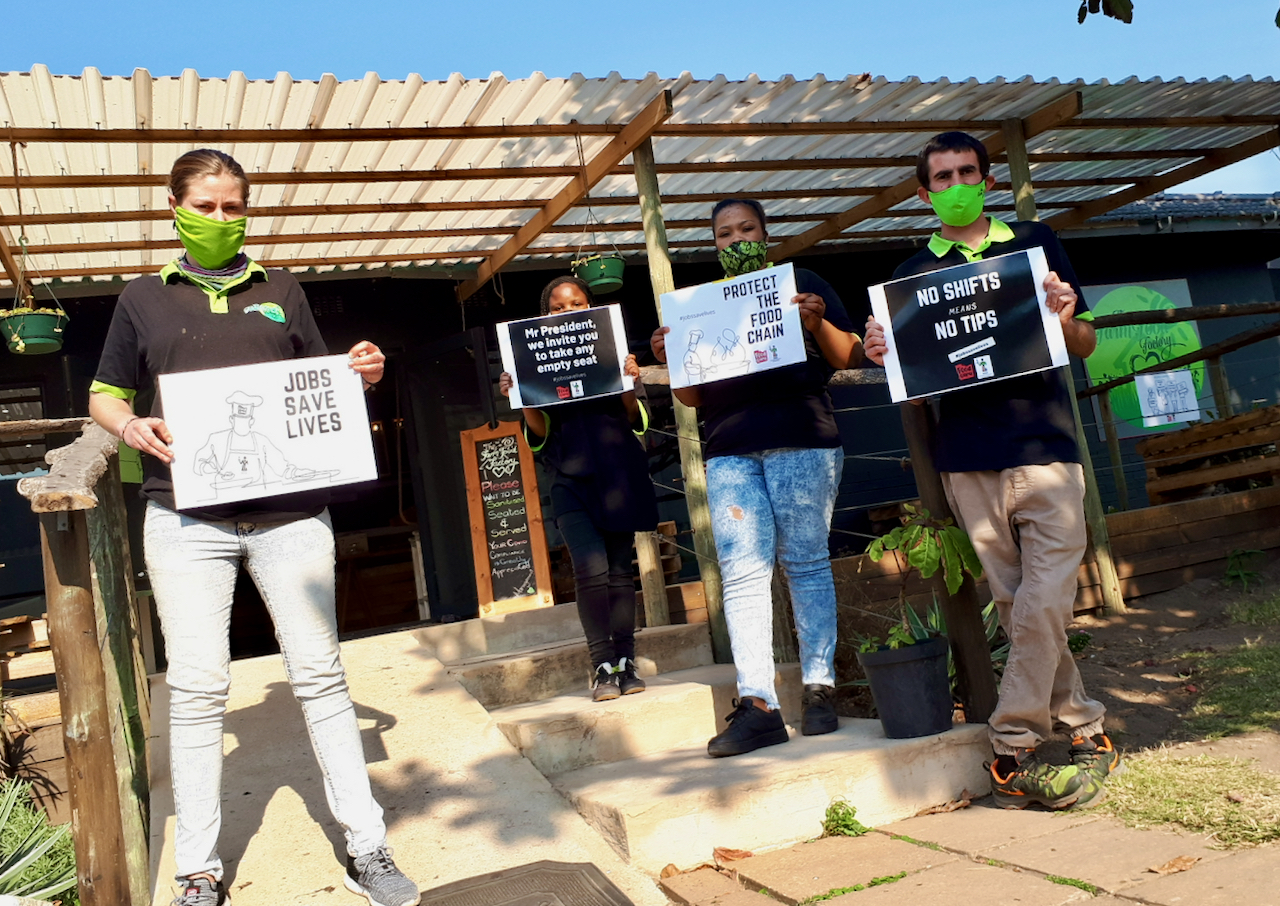
Shelly Beach survivors Donna Monk, Charmaine Nhleko, Thabile Duma and Rowan Brenner. (Photo: Leanne Galloway)
Chef Leanne Galloway took a stand with her remaining staff for the survival of her Farm Food Factory and KZN’s Shelly Beach on Wednesday.
“We stand up for our lives, for our jobs, for our children, for our suppliers,” she said.
Asked by the SAPS not to close the road, they stood “for our industry” on the sidewalk.
“We were pumping every morning in January. Now we’re running at maybe 15%. It costs more to open most days than we make.
“We were asked to close to fight the curve. We complied. We closed for five weeks. We expected assistance for staff, which we didn’t get.
“With the curfew, nobody can sit down, enjoy dinner. The staff have to clean up. Catch taxis home. We’ve had to let go of three who built this restaurant with us. We can hardly pay salaries.”
What would you say to the president, I ask her? “We listened to you and complied. We need your help now. Please, allow the relaxed laws. Restaurants are asking for an hour extension on curfew and two drinks per person. At upmarket restaurants, a bottle of wine for two people. The wine industry is also about to collapse.
“People can be mature. Please don’t close down the tourism industry of this country. We know people can be responsible and take the right precautions. We’re taking all the necessary precautions.”
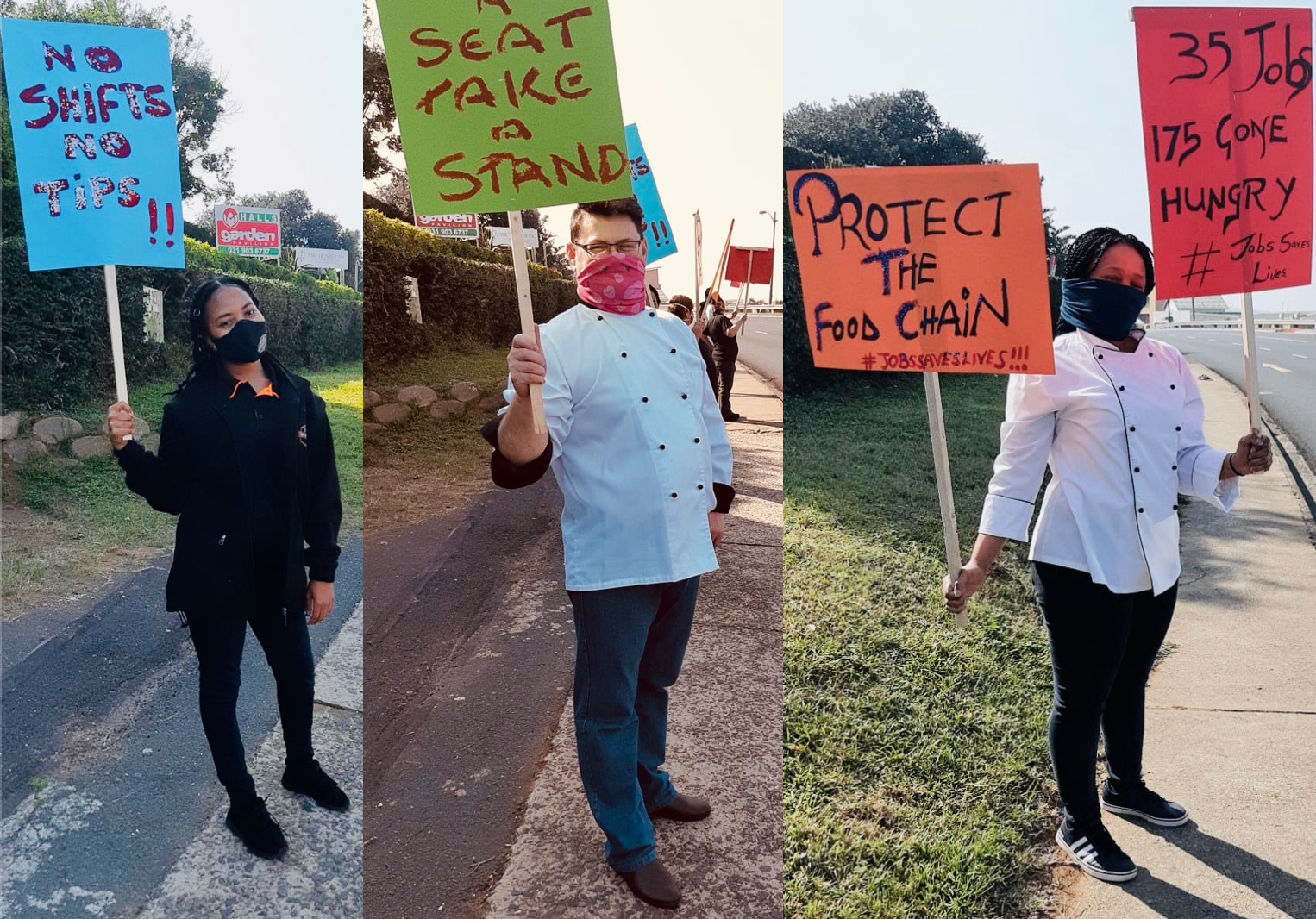
Amanzimtoti’s Barry Haupt with staffers, chef Adelaid Tchele and waitress Paida Motcheamene. (Photos: Sean Peter Miles)
Barry Haupt, owner and developmental executive chef at Friends Family Restaurant and Pub in Amanzimtoti, only opened his gastropub in December after studying and working in London, New Zealand and Australia. His vision was to come back and share what he’d learned in his own “dream” restaurant.
He’s had to lay off staff and predicts more if the government doesn’t pay attention to what is happening in the hospitality sector. “People are going hungry every day thanks to these decisions,” he says.
“My honest opinion? I don’t think the government understands the layers. The impact of the collapse of our infrastructure. Hotel and restaurant employs the biggest section of the unskilled. I have been declined funding because I am not BEE registered yet 98% of my employees are black. Restaurants employ and train people who would otherwise be jobless.”
He also understands alcohol is a problem. “But not everyone abuses it. Even if they limit it, allow two or three drinks with a meal, that is manageable.”
He’s pretty much changed from sit-down to takeaway to survive, with all the costs involved. The thermal delivery bags required by the health department. Packaging to keep food warm. “Costs haven’t nearly been covered in the two or three months we’ve been doing this.
“At this point, even if restrictions are lifted, the restaurant industry isn’t going to just bounce back. And the more we are restricted and undermined, the more difficult it’s going to be.”
In Johannesburg, MARIE-LAIS EMOND writes:

The blackboard menu advertises job losses at Nuno’s in Melville. (Photo: Marie-Lais Emond)
The simple act of setting out a table and chairs in public suddenly seemed full of old or new meaning, full of promise. It was something most of us hadn’t seen for so long.
Most stared. Then they laughed, some nervously. Then people who had simply come out to see what all the fuss was about started sitting down at the tables in the street. And placing orders somewhat incredulously. Food arrived and drinks, not the alcoholic sort but cold things to drink under the sun. Masked people were waving and calling to one another. Photographers photographed each other. Cameramen and TV crews crossed each other’s lines of sight. But it was alright. Everything seemed beautiful.
That was the word Wendy Alberts, CEO of RASA (Restaurant Association of South Africa) used a few times in a row. She sounded emotional when she reeled out from her three hour meeting in Parkhurst with the Minister of Tourism, Mmamoloko Kubayi-Ngubane, where Alberts handed over the memorandum from RASA and where they discussed possible solutions and “how we can move forward”.
“I loved seeing how your beautiful businesses were brought to life… how you came together; the magic and energy and your beautiful placards highlighting the plight we are in, with your staff and their families… what an incredible and beautiful day,” Alberts said.
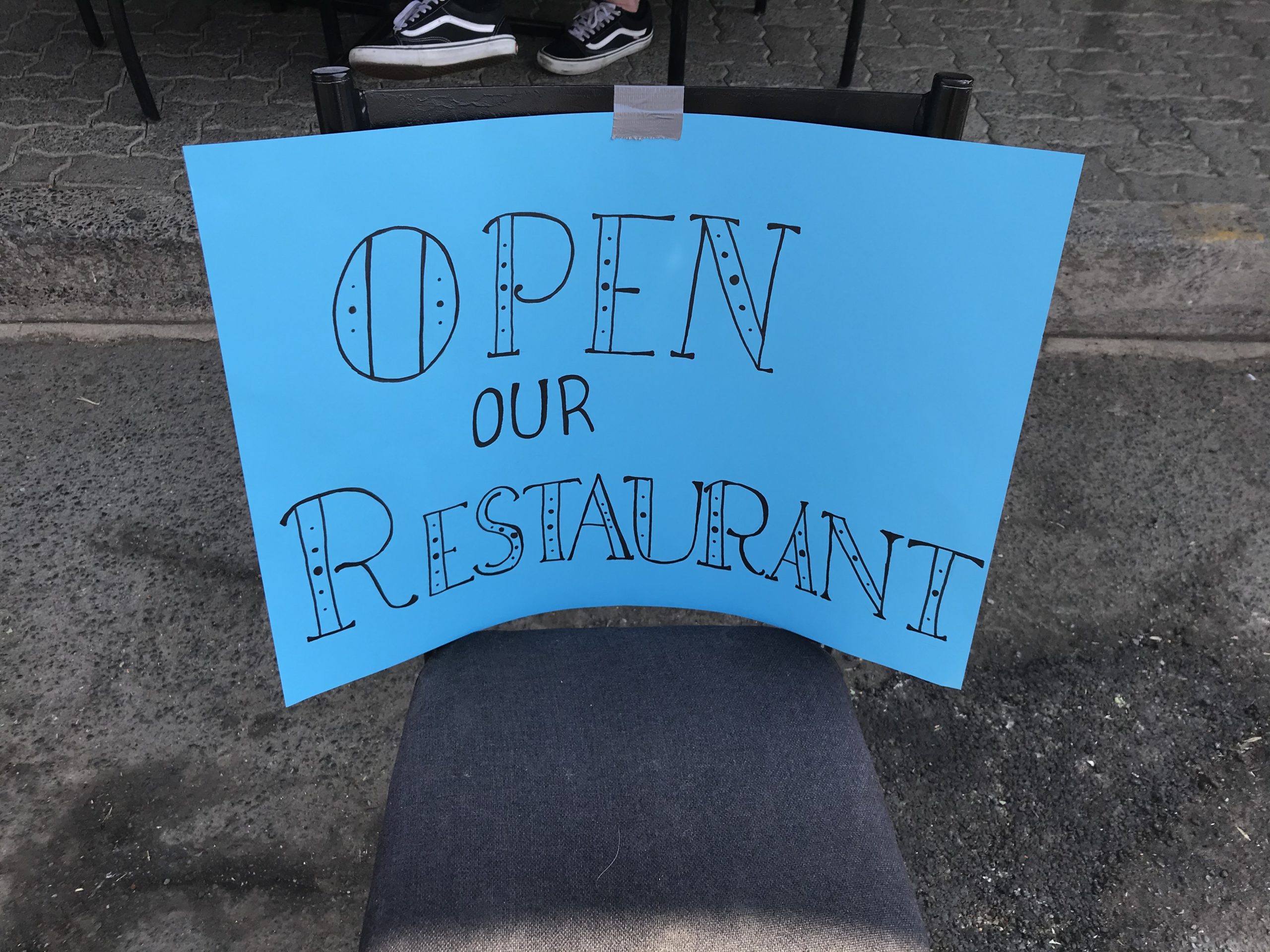
(Photo: Marie-Lais Emond)
Next to a sandwich board standing on a traffic island in Parkhurst, near Hudsons, a place specialising in hamburgers, I met Gillian McLaren, travel writer. She showed me an enviable picture she’d taken of a man at a street table. He had flowing grey hair, a beard, blue surgical gloves and was wearing a plastic visor that featured a neat hole slightly to one side, through which he was smoking an illicit cigarette. The sign on the sandwich board read “Save Our Burgers”.
After threats of disruption in the media from the SAPS, I saw none at any of the places I visited and merely heard about slightly menacing drive-bys in Parkhurst, possibly because that’s where the minister was.
People all over Johannesburg were experiencing the same thing, joy. It was like that in 7th Street Melville, in 4th Avenue Parkhurst, In a different 4th Avenue Linden, in Hobart and Grosvenor roads, Bryanston and plenty of other areas where there are clusters of restaurants.
Many restaurants had invited their suppliers, their regulars and their staff. Gisela Krischker of Choo Choo in Linden did this too, mentioning that the effects have obviously affected everyone along the line and that “the carguards are even affected by it. There’s nothing to guard now”.
Had it only been two hours of jollity, of a taste of restaurant life we do appear to miss a lot? Suddenly it was two o’clock and tables were being packed away. Outside Xai Xai in Melville, the invited staff had been given pizzas for lunch. One of the two owners came out and announced, “You guys are getting R50 each for your transport.” All of the staff looked down at that. It’s difficult to maintain dignity in the face of charity. It was the moment after the fun when the realisation that you have no work and no money becomes real again. It tugged at me emotionally too and I left. Because it’s wonderful to pretend we’re in a different warp for a bit but the toughest fact is that most people affected by restaurant closures and difficulties are, of course, the people that were actually making the restaurants run, and their families. DM/TGIFood


















 Become an Insider
Become an Insider